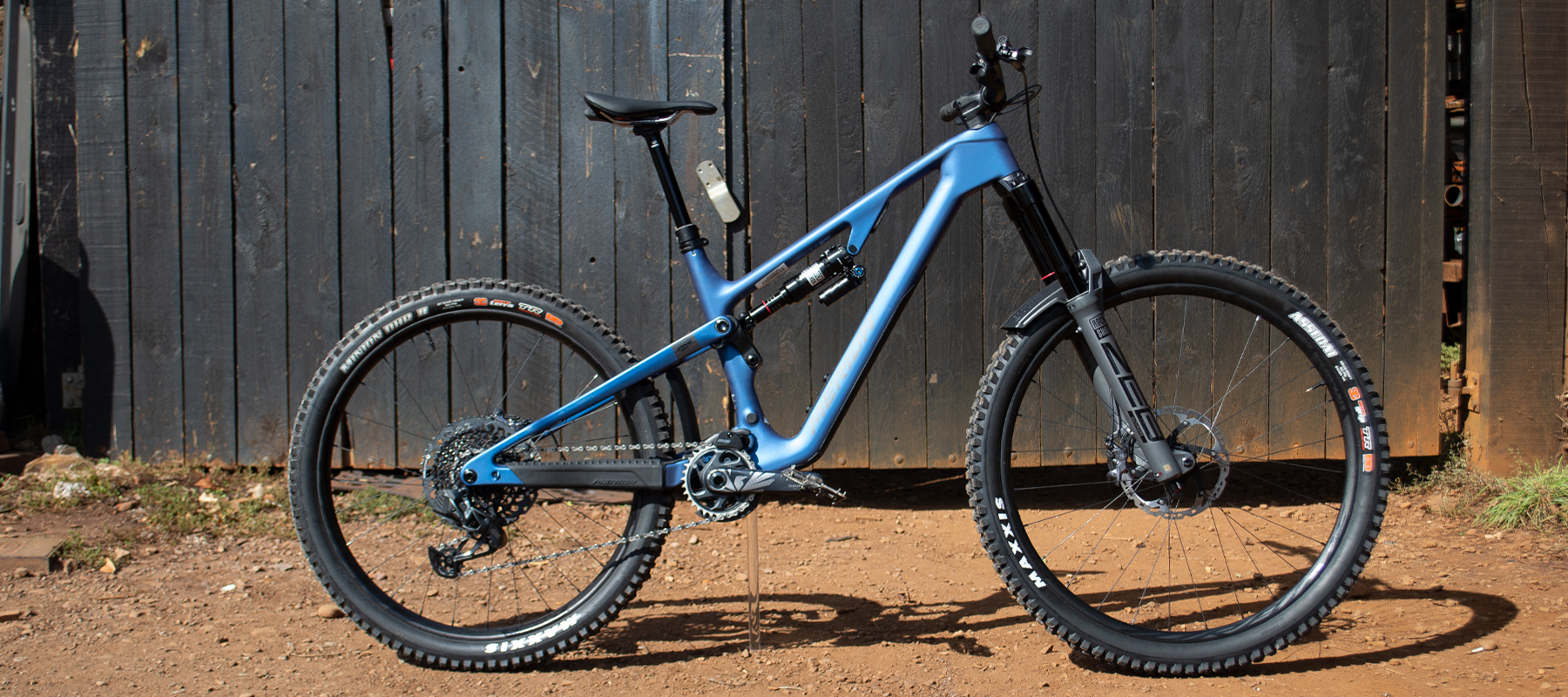Early Verdict
This complete reinvention of the One-Sixty from the ground up has resulted in a properly capable hard hitter with lots of well thought out features.
Pros
- +
Capable enduro machine
- +
Climbs well for a longer travel bike
- +
Excellent electronic shifting
- +
Dropper can be tuned for an exact fit
- +
Geometry flip chip for 27.5 or 29in wheels
Cons
- -
Fork lacks sensitivity unless well set up
- -
Hefty tires are slow rolling
Why trust BikePerfect
Merida have just relaunched their One-Sixty and One-Forty bikes, with a new design team rebuilding them from the ground up. Essentially everything on the new bikes has been completely redesigned from what went before and will form the basis of Merida's trail bikes for the foreseeable future.
We got some time on the new One-Sixty 8000 model ahead of the launch and rode it over Exmoor's most challenging terrain including stages of the three-day Ex Enduro before and during the event itself. So does the new One-Sixty have what it takes to take on the best enduro bikes around? Let's take a look...
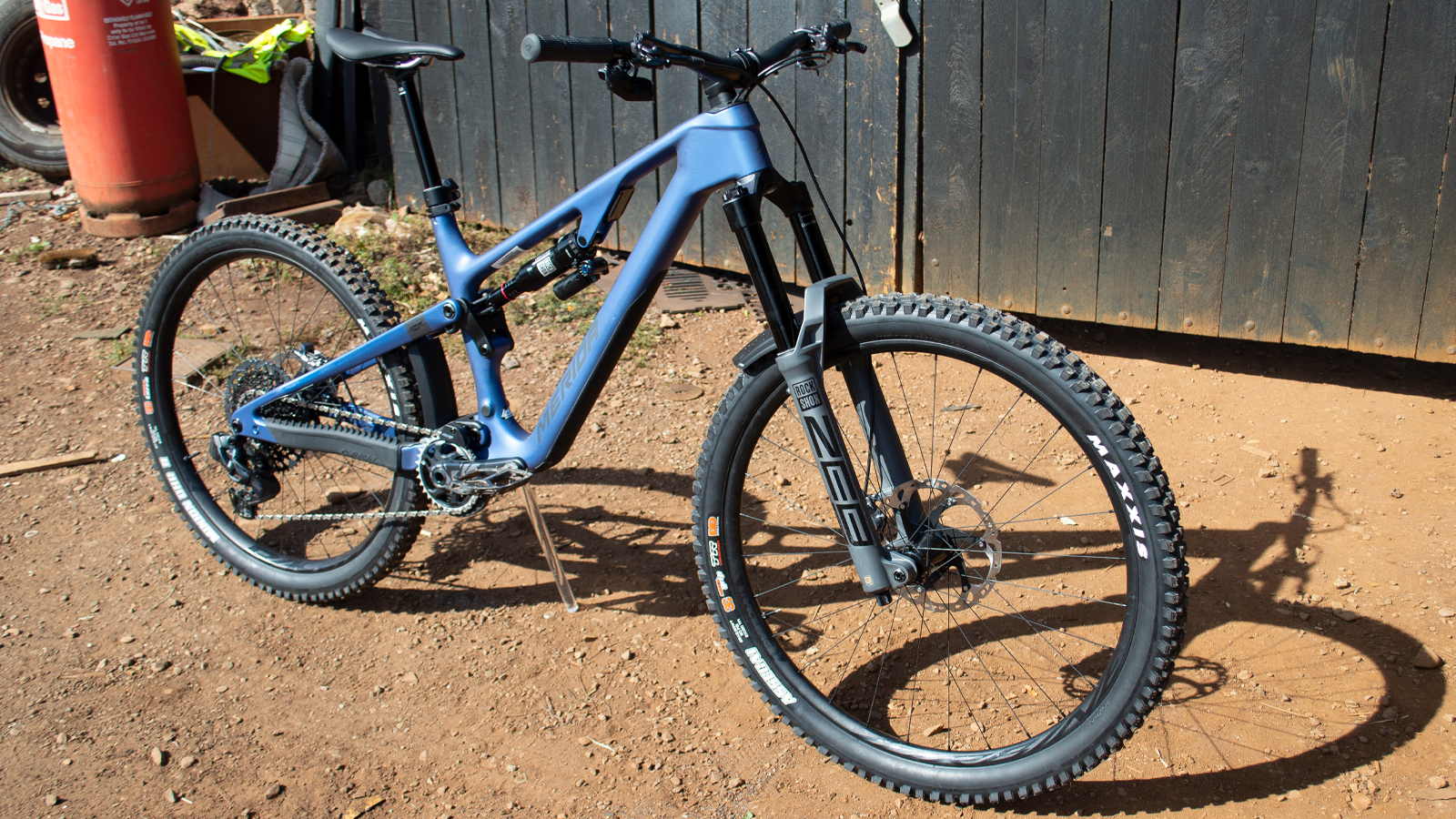
Design and specifications
The five model One-Sixty range starts with the alloy framed 500 (£2,750 / €3,350) and 700 (£3,300 / €4,080) models, followed by the carbon framed versions – the 6000 (£4,600 / €5,760), the 8000 (£6,600 / €8,460) and the Rockshox Flight Attendant equipped top end 10k model (£9,000 / €11,900).
Sizing-wise, Merida has taken a leaf out of the Pole/GeoMetron book and sized their bikes by reach – x-short, short, mid, long, and x-long. The frame sizes are pretty roomy too, my mid-sized test bike had a reach of 470mm which would equate to a large on bikes from the majority of manufacturers.
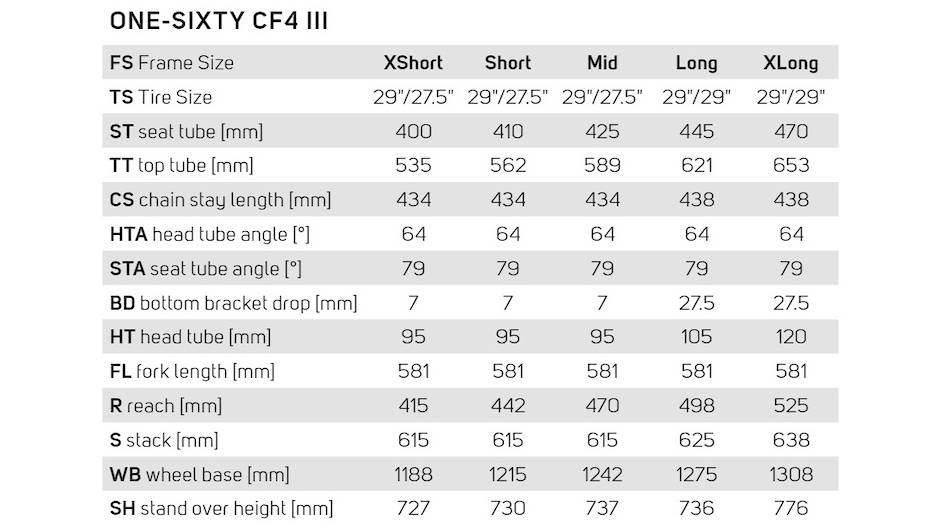
The frames mainly grow in reach and wheelbase, while the seat tube and head tube lengths change as little as possible as you move through the sizes. A key part of this concept is the Merida Team TR branded dropper (manufactured by Limotech) which comes with every bike in the One-Sixty and One-Forty ranges.
Dropper travel can be tuned from a maximum of 230mm down to 30mm via an internal cable system. It's easy to adjust the travel using the access port on the non-drive side of the dropper and enables riders to tune the saddle height perfectly to their leg length – as well as getting maximum travel right down to the seat post collar.

Following the consistent ride theme, every bike size, sorry, length can run a 29-inch or 27.5-inch wheel if you so desire. A flip-chip in the suspension rocker allows riders to switch between a 27.5 or 29-inch wheel with minimal effects on the bike's geometry. As standard, the smallest three frame sizes come with a mixed wheel 'mullet' set-up of a 29-inch wheel on the front and a 27.5-inch at the rear, while the two biggest sizes come with a pair of 29-inch wheels.
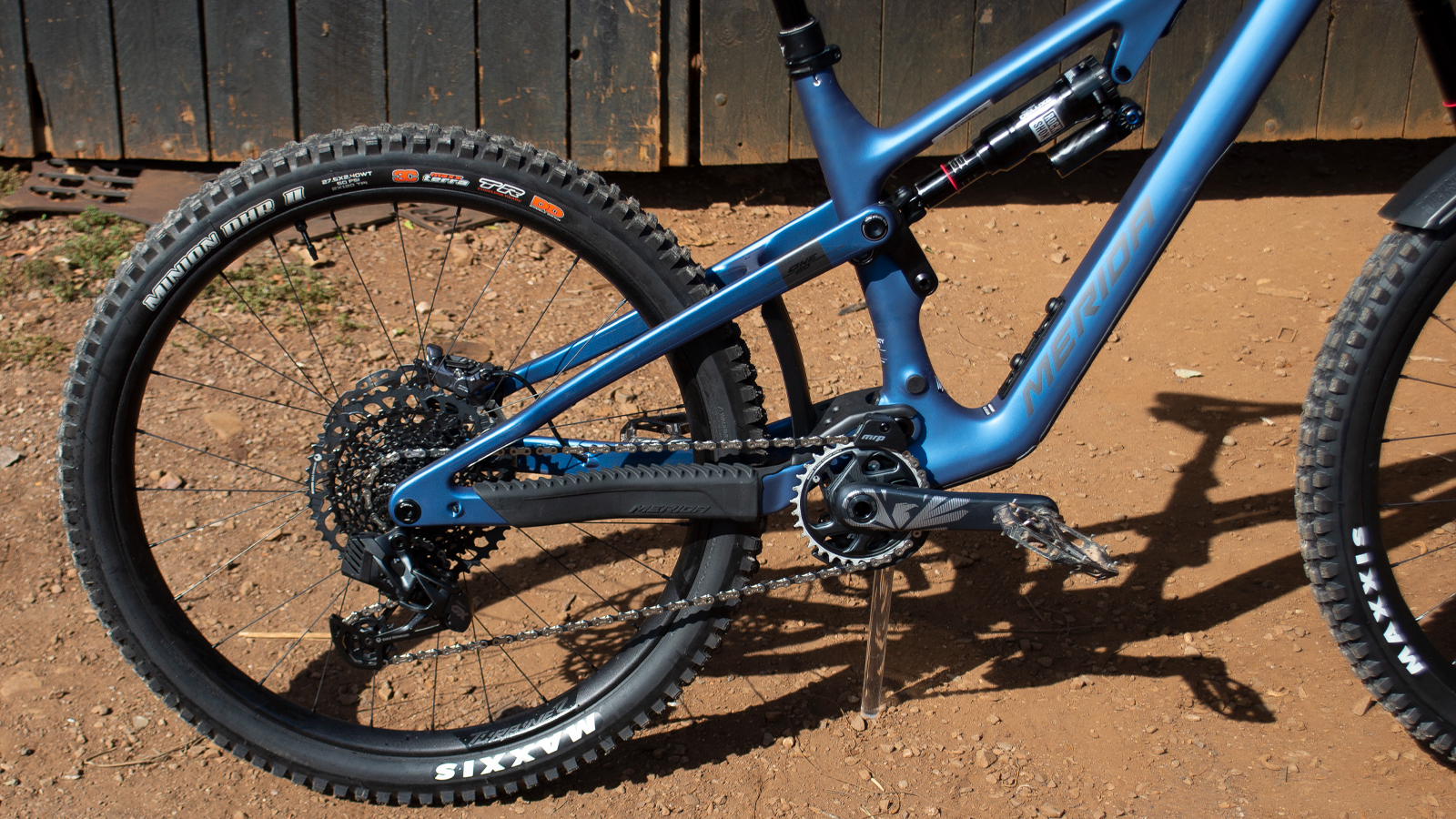
Suspension on the 8000 comes in the form of a 170mm RockShox Zeb Ultimate fork coupled with a Super Deluxe Ultimate shock. Both the One-Forty and One-Sixty ranges are built with a similar suspension system to the Merida Ninety-Six XC bike which uses flex stays instead of a rear pivot, with a rocker joining the stays to the shock.
On-bike storage has become a big deal over recent years and all the new bikes come with a magnetic Fidlock mount and a bottle (YT take note of the latter). The carbon models in both the One-Sixty and One-Forty ranges have a removable panel on the underside of the downtube. Inside you'll find a tool roll big enough to take a pump and a few other essentials. You'll need to remove a 4mm Allen bolt to access the storage (a 4/6mm/T30 key is cunningly hidden in the rear axle lever), so it's not as accessible as the likes of Specialized's SWAT system, but there is a decent amount of capacity. The removable panel also gives access to the internal cable liners making servicing easier. The alloy bikes have a similar set-up with a smaller access panel and capacity, but production models weren't available to inspect during the launch.
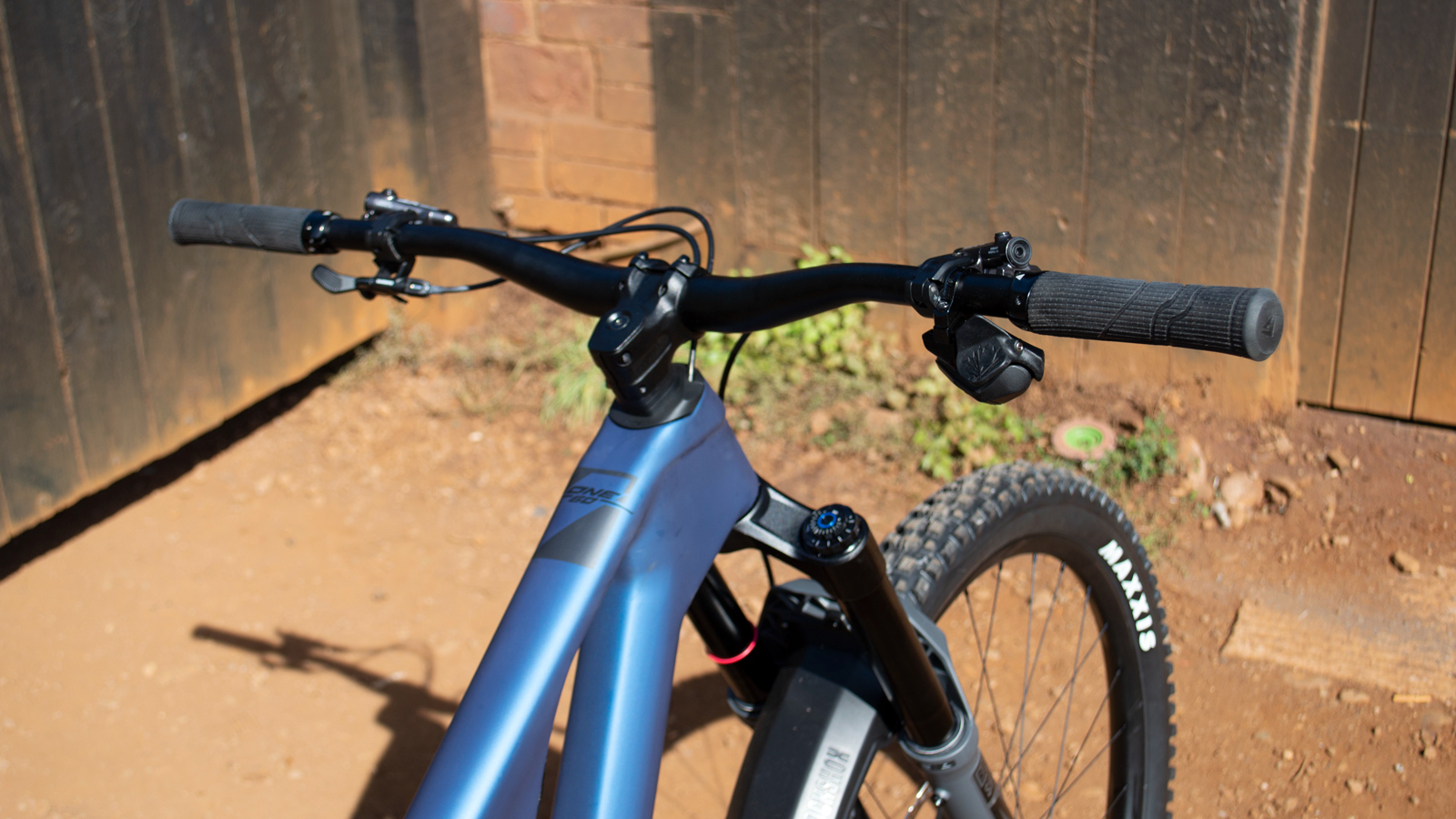
Performance
I rode the One-Sixty over a range of trails in the Exmoor National Park, Somerset. We hit everything from open rocky descents to loose shale switchbacks and steep off-camber turns to fast, tight, rooty singletrack.
The more demanding the terrain, the better the One-Sixty felt, easily taking the bigger hits in its stride and holding lines really well down properly rough sections. Using default weight suspension settings I wasn't getting full fork travel to begin with though and on my first rooty loops the Zeb Ultimate felt really unforgiving, as did the tires with their DoubleDown casings. Some more involved fettling (removing the fork's bottomless token, adding extra sag, and losing some tire pressure better suited my 70kg weight), and the ride was vastly improved.
Over steep off-camber trails, I was really impressed with how well the bike tracked over roots and rocks and how much grip I got from the hefty Maxxis tire combo. There were times when I fully expected to lose the front end, but even as it started to slip out, the bike quickly regained traction and saved me from a face full of dirt.
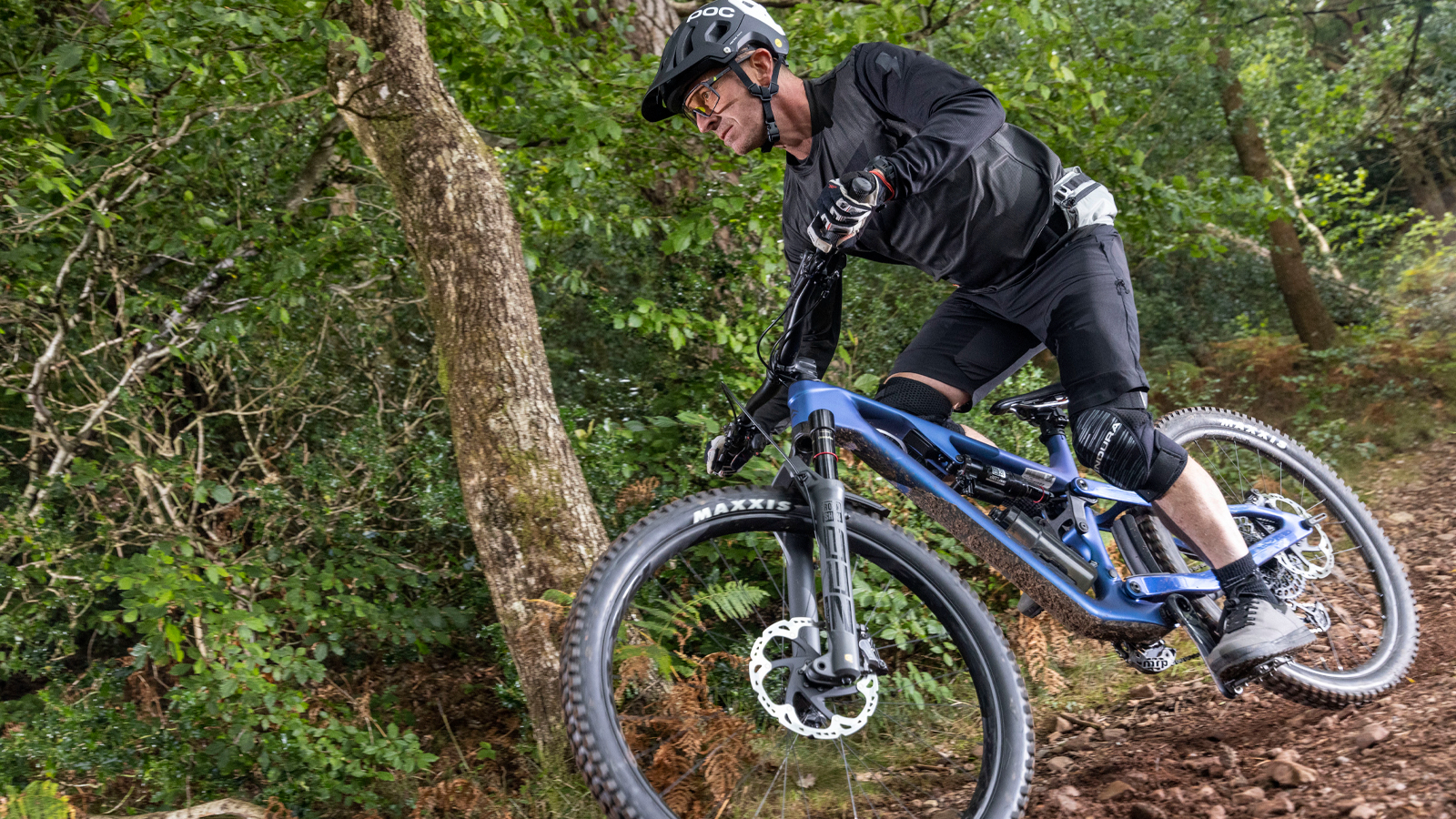
Exmoor is renowned for its serious climbs and we hit plenty of them too. A steep 79-degree seat tube angle gave me a good pedaling position over the cranks and I didn't have to overly weight the bars when things got properly steep either – despite the 170mm fork. I never needed to lock the shock out when climbing, as it felt well supported at the beginning of its stroke so pedal bob wasn't a big issue.
Being an enduro bike weighing over 15kg, the One-Sixty is never going to be a rapid or easy climber though. And while I was very glad of them on sketchy descents, with well over a kilo of slow rolling rubber on each wheel, I was far less of a fan of the tires when the trails turned upwards.
Early verdict
After getting a few days of riding in on the One-Sixty, Merida look to have done an excellent job on the newly redesigned bike. The 8000 is a highly capable performer on the descents and climbs pretty well for a bike in its category too.
There are plenty of well-thought-out features, such as the tune-able dropper, and I'm looking forward to getting back on the One-Sixty for some longer-term testing as soon as I can.
Our technical editor, Guy Kesteven, got some more time later in the year on the bike, so for more info, see his Merida One-Sixty 8000 review too.
Tech Specs: Merida One-Sixty 8000
- Price: £6,600 / €8,460
- Discipline: Enduro/gnarly trail
- Frame: One-Sixty CF4 III carbon fiber
- Head angle: 64 degrees
- Seat tube angle: 79 degrees
- Reach: 470mm (mid tested)
- Fork: Rock Shox Zeb Ultimate, Air, 170mm suspension travel, 42mm fork offset
- Shock: Rock Shox Super Deluxe Ultimate 162mm travel, adjustable low-speed compression
- Wheels: Race Face Turbine R30, 110x15mm width front hub, 148x12mm width rear hub, 28mm inner width, Centerlock, Sram XD, 29-inch front, 27.5-inch rear
- Tires: Maxxis Assegai / Maxxis DHR II, 29x2.5", fold, TR DD 3C MaxxGrip, 27.5x2.4" XS/S/M 29x2.4" L/XL, fold, TR DD 3C MaxxTerra
- Drivetrain: SRAM GX Eagle AXS, wireless, Shimano SL -MT800-IL / Sram GX AXS Controller shifter, Sram XG-1275 Eagle, 10-52 teeth, 12-speed cassette
- Brakes: Shimano XT four-piston, 203mm rotors
- Seat post: RockShox Reverb AXS, 150mm travel (size large)
- Saddle: Merida Expert SL, V-mount, with Merida mini-tool
- Bar and stem: Merida Team TR, 34.9mm diameter, 0mm setback, 30-230mm travel
- Headset: Merida 8151
- Sizes: X-Short, Mid, Long, X-Long
- Weight: 33.8lb / 15.3kg (size Mid)
- Availability: Certain models from October 2022, full range early 2023

Rich Owen joined the BikePerfect team as editor in 2021. He's worked as a journalist and editor for over 24 years, with 12 years specializing in cycling media. Rich bought his first mountain bike (a rigid Scott Tampico) in 1995 and has been riding MTB for almost 30 years.
Current rides: Merida One-Forty 6000, Banshee Paradox, YT Jeffsy Core 3, Saracen Ariel 30 Pro
Height: 175cm
Weight: 69kg
